Donald Trump says he would consider closing certain mosques
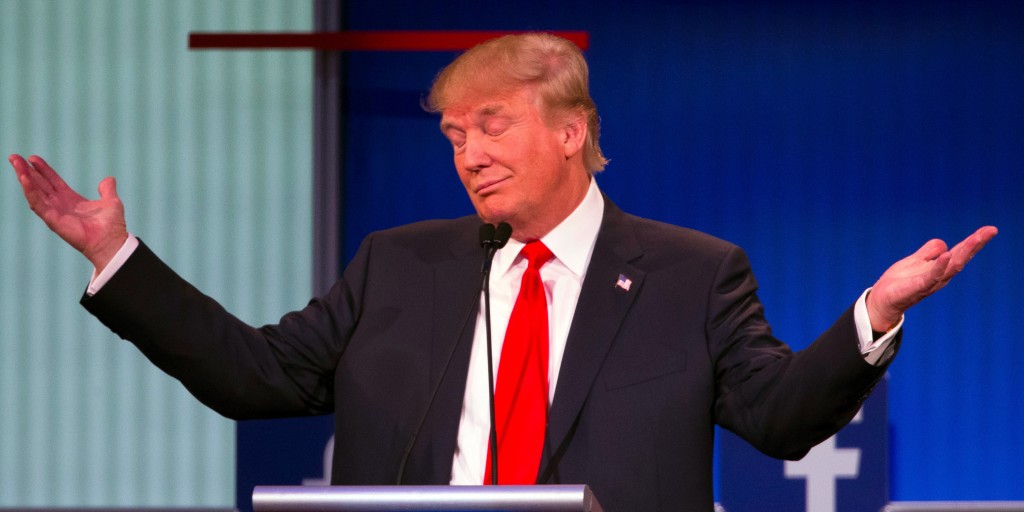
Republican presidential candidate Donald Trump says he would consider closing U.S. mosques with radical leadership because of the Paris attacks if he were elected president. “I would hate to do it, but it’s something that you’re going to have to strongly consider,” Trump told MSNBC in a phone interview Monday. Trump and his rivals have been working to articulate how they would respond to last week’s attacks, which killed 129 people and left hundreds wounded. Trump, who has been pushing for a more aggressive response, also said Americans must reassess some of their civil liberties in response to growing threats from the Islamic State group. “We have to be much tougher,” he said in another interview on CNBC. “We are going to have to give up certain privileges that we’ve always had.” “Surveillance took a big turn over the last 48 hours,” he added. “Forty-eight hours ago everybody was saying, ‘Well we want our freedoms, we don’t want this to happen.’ And now, all of sudden, people are saying, ‘Hey listen, you can listen to my phone conversations.’” That surveillance, he argued, should include intelligence-gathering in and around mosques. “Well you’re going to have to watch and study the mosques because a lot of talk is going on at the mosques,” said Trump, who complained that New York City, where he lives, has ramped down its efforts to infiltrate places of Muslim worship. Trump appeared to be referring to the New York Police Department‘s Demographics Unit, which The Associated Press reported in 2011 was spying on Muslims and mosques around the city with help from the CIA. The group assembled databases on where Muslims lived, shopped, worked and prayed, infiltrated Muslim student groups, put informants in mosques and monitored sermons. The NYPD, under Mayor Bill de Blasio, announced it had abandoned the program in April of last year following lawsuits and complaints. Trump told a weekend rally that things would have turned out differently in Paris had the victims of the attacks been armed with guns. He repeated that assertion in the CNBC phone interview. “Had there been some guys with a gun, there would have been a shoot-out and probably the primary people that got whacked would have been the killers,” he said. “Had there been other people carrying weapons, you would have had a lot different story, believe me.” Trump criticized President Barack Obama for not moving earlier to destroy the Islamic State sites that France bombed over the weekend. He said the U.S. should be going more aggressively after the group’s oil and financing and pressing other countries to intensify their fighting against the radicals. Republished with permission of The Associated Press.
Ben Carson: Congress should stop funding refugee resettlement
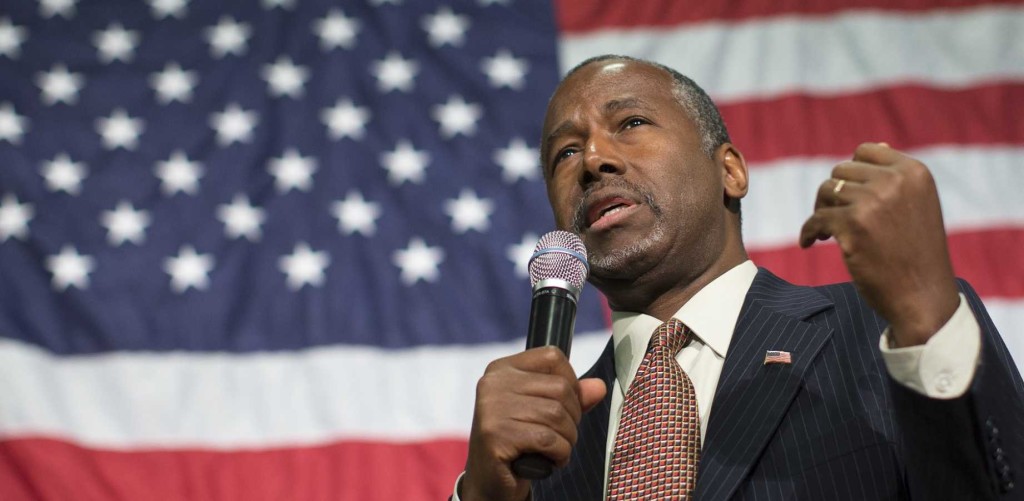
Republican presidential candidate Ben Carson is calling on Congress to withdraw funding to resettle Syrian refugees in the United States, arguing there is no credible way to tell the difference between an Islamic State militant and an innocent citizen fleeing war. In a letter to House Speaker Paul Ryan, Carson urged congressional Republicans to “extinguish” Syrian resettlement programs, saying the United States “cannot, should not and must not accept any Syrian refugees.” Carson joins other GOP presidential candidates expressing caution or outright opposition to resettling Syrian refugees in the U.S. Elsewhere across the political landscape, at least 10 governors, including Michigan and Alabama, have taken action to block resettlements or said they are exploring their legal options. Members of the Republican-controlled Congress, too, said on Monday they will try to use must-pass government spending legislation to block President Barack Obama‘s plans to increase the flow of Syrian refugees into the U.S. Obama earlier this year announced plans to accept as many as 10,000 Syrian refugees this fiscal year, up from 2,000 in fiscal 2015. The State Department manages refugee resettlement with the aid of private organizations like Catholic Charities. Democratic presidential candidates have called for the U.S. to continue to let in Syrian refugees, but only after proper background checks. Carson suggested no such practical solution exists where Syrian migrants are concerned. “This is a relatively unique situation for our country,” he said. Carson, who is near the top of many GOP presidential preference polls, joins Texas Sen. Ted Cruz, former Arkansas Gov. Mike Huckabee and Florida Sen. Marco Rubio as candidates who have called for closing American borders to Syrians. Former Florida Gov. Jeb Bush suggested over the weekend that the United States restrict admission only to Syrian Christians. Louisiana Gov. Bobby Jindal on Monday issued an executive order intended to block Syrian refugees from being resettled in his state. Obama on Monday chided Republicans he says are effectively imposing a “religious test” on people fleeing war. “That’s not American. That’s not who we are,” the president said. Carson retorted, “Of course we don’t apply religious tests, but we should apply an ideological test. I would be very reticent to bring in people ideologically opposed to the ideals of America.” He did not explain the distinction between testing for ideology and religious belief. As for the Syrian refugees already in the United States, Carson said, “I would watch them very carefully.” Carson’s idea of cutting off funding would face roadblocks on Capitol Hill, particularly in the Senate, where Republicans do not have the votes to stave off a Democratic filibuster. But House Budget Chairman Tom Price issued a statement on Monday saying the United States “must suspend our refugee program until certainty is brought to the vetting process.” Republished with permission of The Associated Press.
Marco Rubio’s Capitol Hill fundraiser to draw wave of new supporters

Taking advantage of a surge in popularity after several strong Republican Party debate appearances, Marco Rubio expects to draw a new crop of supporters with a Capitol Hill fundraiser Monday. As reported by Alex Isenstadt of POLITICO, the event invitation names about 70 financial backers for the Florida senator’s presidential campaign — more than half came on board after Rubio’s debate performance in Boulder, supporters say. Originally, the event was to be held at a town house in Washington D.C., but as the guest list began to swell, Isenstadt writes that organizers moved the reception to the prestigious Capitol Hill Club. Names on the invitation include several names new to the campaign: Verizon lobbyist Peter Davidson; NextEra Energy lobbyist Christopher Chapel; Crossroads Strategies lobbyist Matthew Lapinski and Russ Thomasson, a former staffer for U.S. Sen. John Cornyn of Texas. Also scheduled to appear are a number of House members, such as U.S. Reps. Sean Duffy of Wisconsin, Darren LaHood of Illinois Austin Scott of Georgia and Todd Rokita of Indiana. Isenstadt notes that this new push for hard dollars comes after Rubio recently won the support of billionaire hedge fund manager Paul Singer, a leading Republican bundler.
Jeff Sessions, lawmakers try to block Syrian refugee plan
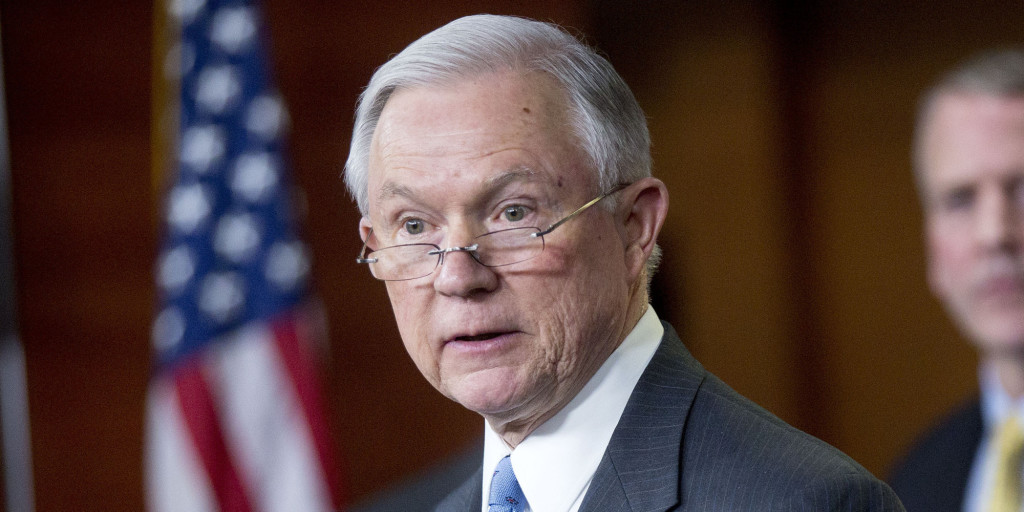
Republican lawmakers may try to use must-pass government spending legislation to block President Barack Obama’s plans to increase the number of Syrian refugees entering the U.S. Pressure to do so follows Friday’s deadly attacks in Paris. Congress is facing a Dec. 11 deadline to approve a spending bill to keep the government running. Republican Sen. Jeff Sessions of Alabama released a letter on Monday saying the legislation should require congressional approval for the president’s refugee resettlement plans and the money needed to carry them out. New House Speaker Paul Ryan of Wisconsin tells conservative talk host Bill Bennett on Monday that he’s looking at all options. In September the White House announced plans to accept an additional 10,000 refugees from Syria, with no congressional approval needed. Republished with permission of The Associated Press.
This week in the U.S. House of Representatives: Nov. 16 – Nov. 20
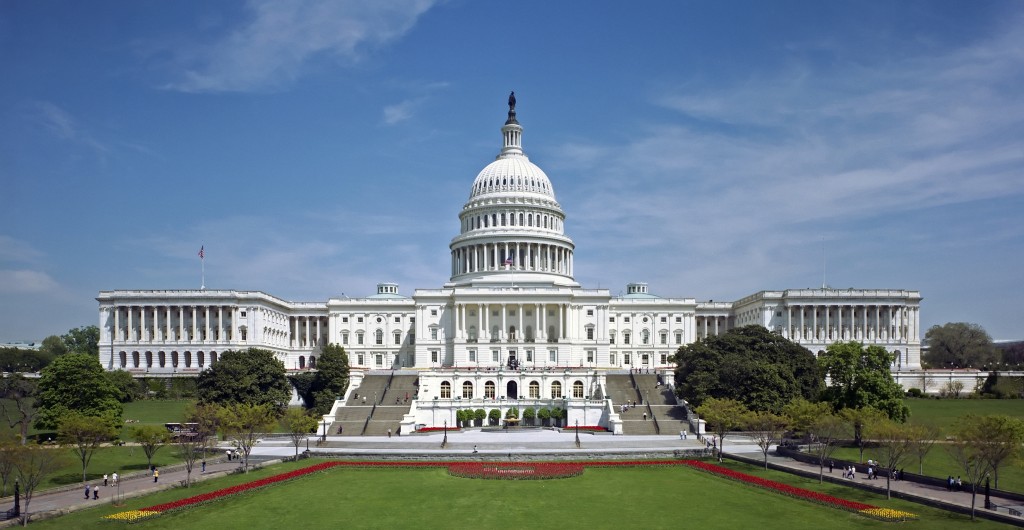
The U.S. House of Representatives is back in session this week after last week’s Veterans Day recess. On Monday, the House is in session and will consider several bills under suspension of the rules. A full list of bills can be found here. That same day, the House may also consider a motion to concur in the Senate amendment to H.R. 2262: Spurring Private Aerospace Competitiveness and Entrepreneurship (SPACE) Act. The bill includes numerous provisions to bolster the U.S. commercial space industry. They may also consider a short-term reauthorization of federal-aid highway and transit programs. House and Senate conferees are currently negotiating a long-term reauthorization but are not expected to reach a final agreement this week. The current authorization expires on Friday, Nov. 20. On the floor of the U.S. House of Representatives the remainder of the week: H.R. 511: the Tribal Labor Sovereignty Act. The bill adds Native American tribes to the list of entities that are excluded from the definition of “employer” in the National Labor Relations Act and re-instating Congress’ initial intent when it first passed the NLRA in 1935, thereby treating them similarly to state and local governments. Alabama co-sponsors: Rep. Bradley Byrne (AL-01); Rep. Martha Roby (AL-02) The House may consider a motion to go to conference on legislation reauthorizing the Elementary and Secondary Education Act (ESEA) of 1965, which under its last reauthorization was known as No Child Left Behind (NCLB). The House in July passed H.R. 5, the Student Success Act to reauthorize ESEA through 2019 and make fundamental changes to many of its programs, while the Senate later that month passed its own ESEA reauthorization (S. 1177). H.R. 1737: the Reforming CFPB Indirect Auto Financing Guidance Act. The bill nullifies 2013 guidance issued by the Consumer Financial Protection Bureau (CFPB) denying the public a chance to comment on regulations directly impacting them. Alabama co-sponsors: None H.R. 1210: the Portfolio Lending and Mortgage Access Act. The bill creates a safe harbor from lawsuits for banks that originate non-qualified mortgages that do not comply with ability-to-repay requirements, as long as the bank retains the mortgage in its own portfolio. The bill is meant to unwind certain restrictive Dodd-Frank regulations in order to expand access to mortgages and home ownership. Alabama co-sponsors: None H.R. 3189: the Fed Oversight Reform and Modernization (FORM) Act. The bill brings greater accountability and transparency to the Federal Reserve. Alabama co-sponsors: None On Friday, the House is not in session.
Steven Kurlander: Faux unité avec Paris — ditching internationalism to protect the American Dream

Over the weekend, images of wanton bloodshed in Paris were conveyed to Americans. Unlike ISIS’ other barbaric attacks, including the horrific bombing of a Russian airliner about a week previous, this attack seemed to hit closer to home. The Paris attacks raised the level of concern and awareness of the ISIS threat to this country. An attack on a major U.S. city was feared next, and expected by many anxious Americans. Immediately, the coordinated attacks in Paris that killed scores of innocent civilians were described by the media and our political leaders strictly in terms of another act of barbaric terrorism against Western civilization. “The killing of innocent people based on a twisted ideology is an attack not just on France, not just on Turkey, it is an attack on the civilized world,” President Barack Obama said at the start of a G20 summit in Ankara, Turkey. In turn, millions of Americans showed solidarity with the people of France, many of us adopting the French tricolor flag as our profile picture on social media sites such as Facebook. We are supposedly all the same citizens of the same Western world. Unlike ISIS, we are, of course, civil people in the truest sense of the word. That mantra was confirmed in the Democratic debate Saturday night by former Secretary of State Hillary Clinton, an architect and continued advocate of such international policies: “But it cannot be an American fight. And I think what the president has consistently said – which I agree with – is that we will support those who take the fight to ISIS.” It’s a mistake that Americans continue to be misled by Obama, Clinton, and their supporting cast in the mainstream press into thinking the fight against ISIS and Islamic radicalism is not strictly our fight to fight alone. Our continuous “internationalist” war against Islamic terrorism, wrapped in the guise of an united effort of “allies” in the Middle East to combat the spread of feudal radical Islamic governance and brutality, is not working. Paris shows that. Americans for too long have had troublingly false expectations of immediate gratification in terms of foreign policing. Internationalism fits that bill because it misplaces responsibility of security and strength onto allies who can’t bring the fight to a level that the United States can to defeat Islamic fascism. It’s easy to say invading Iraq was a mistake. But it wasn’t. It’s time to re-examine whether invading Iraq was truly a mistake in the long view of world events and history, and whether the premature withdrawal from Iraq was the real mistake indeed. The United States is losing a battle now not in terms of saving Western civilization, but in real terms of strictly preserving American borders, way of life, and economy. We have too long fought a half-assed war on terrorism where we’ve substituted expensive electronic gimmickry for boots on the ground, where we’ve made killing a single civilian in a fight against a merciless enemy a war crime, and where we’ve lost perspective of the necessary and proper goal of defeating totalitarianism in order to implant democratic virtues and economic opportunity around the world. It shouldn’t be politically incorrect any more to unleash the massive firepower we hold in our arsenal to actually win a war for a change. We need to begin fighting a real war for the American way of life, not for Western civilization. And it likely won’t be won overnight: It might take decades. Japan and Korea are prime examples of how we did it right. Our long-term occupation of those countries, still secured by American troops, are the model to use. Ideological radicalism died in those countries because we successfully helped build economies that allowed large middle classes to prosper. That relieved the unemployment and restlessness that characterizes the Middle East masses. Paris in the true sense exemplifies the massive failure of President Obama’s ananchronic internationalist foreign policies that have both diminished our power overseas and endangered our security at home. It’s time to fight a brutal war against ISIS and the citizenry who support them, occupy territories in the Middle East, and recreate and stabilize the boundaries to better reflect the tribal nature of the region, and to foster economic opportunity through capitalism in those regions. Instead of including the French flag in our online profiles to show our solidarity in the fight against ISIS, Americans instead should start flying Old Glory on their social media pages. Steven Kurlander blogs at Kurly’s Kommentary (stevenkurlander.com) and writes for Context Florida and The Huffington Post and can be found on Twitter @Kurlykomments. He lives in Monticello, New York.
Diane Roberts: Stop the French-bashing; we owe them

For reasons that do us no credit, Americans find it easy to insult the French. Perhaps we hate their freedoms – their freedom to live for something other than money, their freedom to enjoy food and sex minus 400 years of Protestant guilt. We call the French “cheese-eating surrender monkeys;” we sneer at John Kerry and Mitt Romney because they speak French. At the Oct. 28th debate, Jeb Bush tried to get clever about Congress’ laziness, accusing them of adhering to a “French work week.” When the French refused to participate in our perfectly stupid invasion of Iraq, we boycotted their wine and some particularly silly congressmen demanded that the House cafeterias serve “Freedom Fries,” and “Freedom Toast.” Now that Paris has suffered terrorist attacks that killed at least 132, some Americans are expressing sympathy and solidarity with France. President Obama called it an “attack on the civilized world.” Buildings from 1 World Trade Center in New York to a bridge in Nashville lit themselves up with the blue, white and red of the French tricoleur. Nous sommes tous Parisiens. Then there’s the Republican Party. Donald Trump castigated the French for their “tough gun control laws.” If only everyone in the concert hall and the restaurant and the stadium had been toting AK-47s like the terrorists, things would have been very different. Newt Gingrich and Anne Coulter piled on, blaming France for not being armed. The politicizing got so bad that Red State’s Erick Erickson, a big gun-hugger himself, tweeted: “I gotta say, it does feel a little icky to turn this attack in Paris into a debate on how France should adopt our 2nd amendment.” Naturally, it’s all Barack Obama’s fault. He didn’t keep U.S. troops in Iraq; he didn’t deal with Syria; he hurt Israel’s feelings; he refuses to utter the words “radical Islam.” We all know that those are magic words, words that would solve the problem. Criticizing Obama’s Syria policy is fair enough: It’s been disastrous. But blaming him for ISIL absolves the neocons of the Bush-Cheney administration whose trigger-happy invasion of Iraq and cavalier treatment of the country, especially the Rummy-Wolfie-Cheney de-Baathification program, poured gasoline on the flame of extremism. Trump would probably describe France as a “loser” country, with its paid maternity leave, fast trains, humane employment laws, and excellent healthcare system. The French, in turn, reject “Anglo-Saxon capitalism” as rapacious and destructive. Nevertheless, the United States could learn from France – as we have always learned from France. French philosophers inspired our Founding Fathers with the idea that government should serve its citizens and that freedom was a human right. Rousseau argued for the state’s “social contract” with the individual; Voltaire championed civil rights and religious freedom; Montesquieu advocated for the separation of powers in government. What, you thought we came up with that all by ourselves? The French tradition of reason, of rational thought, of respect for knowledge, might help Republican presidential candidates get past their hysterical responses. Ted Cruz says ISIL is “coming to America.” Jeb Bush says the U.S. should focus on “Christian refugees”: They’re welcome in the U.S. as long as we make sure they’re the real deal, you know, give them a catechism exam, ask them to eat a bacon sandwich, and see whether they say “Merry Christmas!” instead of “Happy Holidays.” Ben Carson wants to ban any and all refugees from the Middle East. That’ll learn ’em. Because Obama’s going to let in 200,000 Syrians who are almost certainly psychopathic jihadis. Carson would bomb an oil field to make ISIL “look like losers.” Trump wants to bomb, too: all the oil fields. Then Exxon can come in and make everything, as he said, “beautiful.” And, according to him, it’s 250,000 Syrian refugees. The real number proposed by Obama is 10,000. But why let the facts get in the way of a good piece of political insanity? And under no circumstances should we remember that terrorists are often homegrown: Timothy McVeigh, the London suicide bombers in 2005, Anders Behring Breivik, and Dylan Roof were native to the nation they tried to attack. If nothing else, perhaps the Republicans will stop with the French-bashing and remember that if it were not for France, the United States would not exist. The French government sent guns, soldiers and money during the American Revolution, and the Marquis de Lafayette spent millions of his own fortune on American independence. The French deserve better than to be told they should be just like us. Diane Roberts teaches at Florida State University. Her latest book is “TRIBAL: College football and the Secret Heart of America.”
Martin Dyckman: The road to Middle East stability isn’t through war
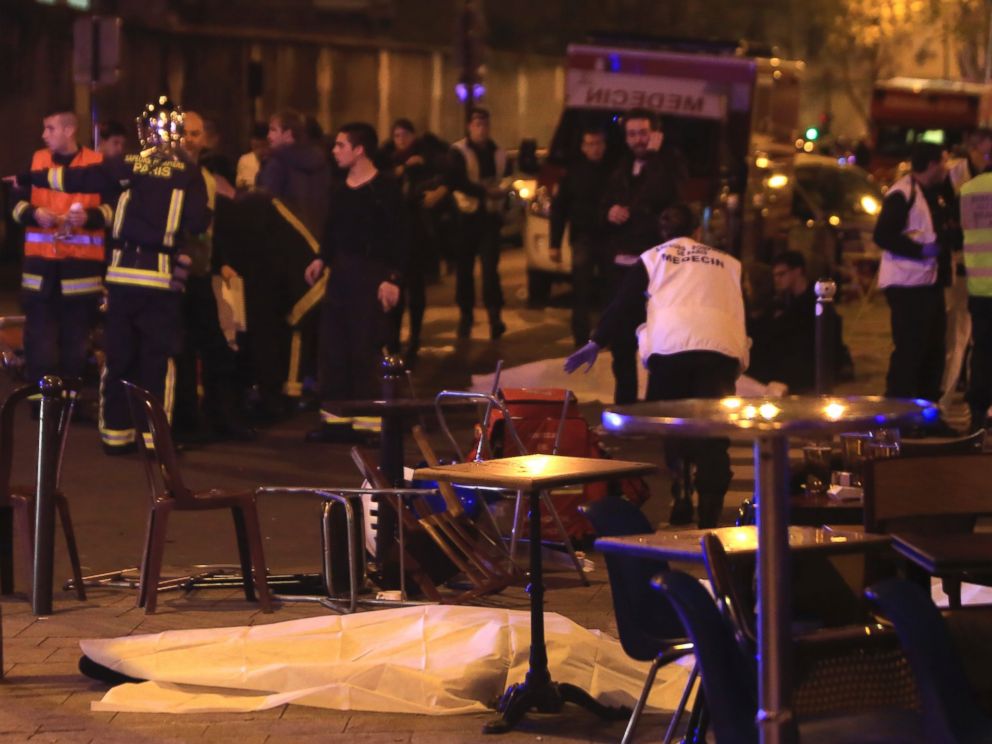
Remember “freedom fries?” That was how some Americans expressed their spite toward France when that nation, with vastly more experience than ours in the Middle East, wisely declined the opportunity to participate in George W. Bush‘s ego-driven war on Iraq. There was a congresswoman from Florida who called for exhuming our military graves and bringing the remains home. She was ignorant of the fact that a grateful France had ceded those sites to the United States forever. The heartbreakingly beautiful cemetery atop the Normandy beachhead is as much American soil as Arlington itself. But in Paris on Friday, France paid a terrible price for the chaos we created when we invaded Iraq and destroyed its government with no thought of history or of the consequences beyond the premature boast, “Mission accomplished.” The evil we didn’t know proved to be worse than the evil we did. Saddam Hussein, for all his crimes, was a stabilizing influence on Iraq and an effective counterweight to Iran – which, unlike Iraq, had declared its enmity of the U.S. and remains an essential ally of the Syrian dictatorship that provides the so-called Islamic State with a plausible raison d’etre. When Bush’s civilian viceroy sacked the entire Iraqi army, he created legions of recruits for al-Qaida and its successor, the Islamic State of Iraq and Syria – aka ISIS. Our failure in nation-building created a corrupt prime minister, Nouri Kamal al- Maliki, whose refusal to renew the status of forces agreement gave President Obama no choice, whatever other he might have chosen, but to bring all our troops home. No president of either party could have left them there exposed to Iraqi laws, arrests and prosecutions. To understand this history is to be warned against repeating it. But America doesn’t learn that lesson very well. Vietnam should have taught us the difficulty of imposing our values on a different culture and to be leery of war where our national interest is not at stake. But the only lesson the politicians took to heart from that unpopular lost war was to abandon the draft and fight the next one with a volunteer force, a force that has been cruelly abused with too many successive combat deployments. In the aftermath of the Paris massacres, we will be hearing again, from the usual suspects, that it’s time to unleash American military might to whatever extent it takes to exterminate ISIS. But even if we could do that – and we can’t – something else would take its place, just as the burgeoning ISIS supplanted a decapitated al-Qaida. The Democratic presidential candidates were right as they agreed, in their separate ways Friday night, that the fight against ISIS must be led by the Muslim states that are the radical movement’s primary intended victims. The United States can help, and should. We are helping already, as are the French, and there is surely more that we can do, short of sending sophisticated weapons to dubious allies who might surrender them to ISIS. But it cannot be seen as an American war, or as French or British. The more important point is that the ultimate solution can not be military. That can only prolong the strife and suffering. By coincidence, the Imam of Asheville’s Muslim community, Egyptian-born Mohamed Taha, was the scheduled speaker Sunday at a brunch sponsored by the Brotherhood of my Reform Jewish congregation. It was well-attended. He talked mainly about the beliefs of Islam and its many similarities to Judaism, and its devotion to peace. But the slaughter at Paris hovered over the morning. “These people,” he said, speaking of ISIS and its ilk, “they are extremists. The majority of Muslims don’t consider these people as Muslims. Mohamed warned against such people … they take some verse of the Koran and they twist its meaning. “They don’t,” he added, “consider us as Muslims.” To defeat the jihadists, he said, requires overcoming the conditions they exploit. “They live in poverty,” he said of the populations where the jihadists enlist most of their support. “They have nothing. We have to help them to establish good countries, good communities. They have nothing in this life, so the extremists promise them everything in the next life.” The solution is not military. The wiser of our American experts on the Middle East, notably including The New York Times columnist Thomas Friedman, have been saying that for years. After World War II, the United States deployed a non-military solution, the Marshall Plan, to help a ravaged Europe rise to its feet in democracy rather than communism. We surely could use a Marshall plan for the Middle East. But how to help the people there to their feet without having the assistance stolen by the corruption that is endemic among the rulers there? I asked that question. Taha acknowledged the difficulty. It begins, he said, with affording an American education, steeped in American traditions and values, to Middle Eastern students who want to study here. Inevitably, perhaps, some few of those students will have other values in mind, like those who prepared here for 9/11. And in the aftermath of Paris, there are politicians who would slam the door, to students as well as refugees, for fear of the few who would exploit our hospitality. But that would be a mistake. It would betray that our values are not, in truth, what we would wish them to be. It would postpone the redemption of the Middle East and perpetuate a war that cannot be won by arms alone. Martin Dyckman is a retired associate editor of the newspaper formerly known as the St. Petersburg Times. He lives in Asheville, North Carolina.
Presidential Primary Brief: 357 days until Election Day
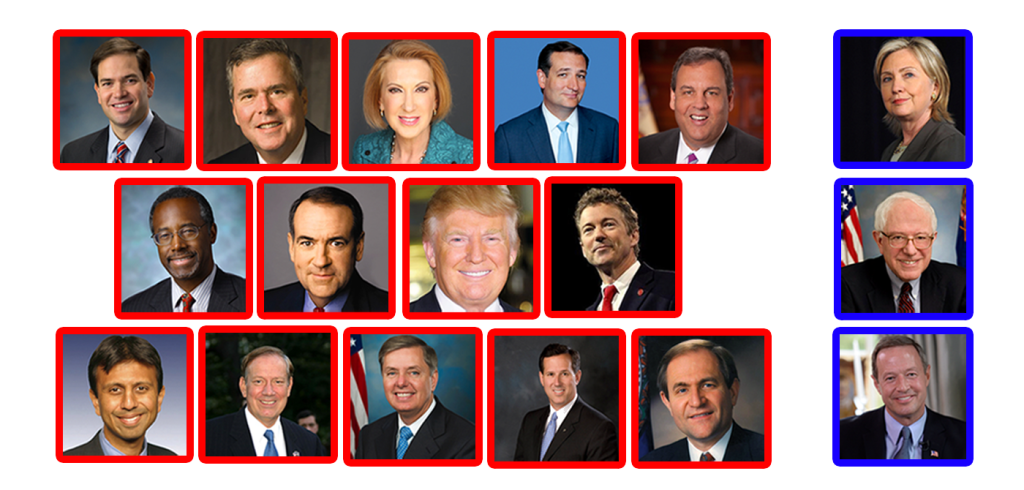
104 days until AL Presidential Primary 357 days until Election Day Convention Dates: Republican July 18-21 2016, Democratic July 25-28 2016 Weekly Headlines: Al Gore declines to endorse Hillary Clinton for President Postal workers union backs Bernie Sanders Fack Check: The second Democratic debate Press Clips: Bush urges U.S. declaration of war against ISIL (Politico 11/15/15) Republican presidential contender Jeb Bush said on Sunday, in the aftermath of the terrorist attacks on Paris, the U.S. should “declare war” on the Islamic State, which is blamed by the French for the deadly attacks. “We should declare war, and harness all of the power that the United States can bring to bear, both diplomatic and military, of course, to be able to take out ISIS,” the former governor of Florida said on NBC’s “Meet the Press,” charging the Obama administration viewed the fight against the Islamic State of Iraq and the Levant as a “law enforcement exercise. Debate exposes Clinton’s Wall Street underbelly (Politico 11/15/15) The widespread expectation was that Saturday evening’s Democratic debate would revolve around the Paris attacks. But it turned out Wall Street policy ended up driving the most striking moments here — painting a picture of a party animated most by its antipathy toward big banks, but divided over how to handle them. Accordingly, a discussion of bank regulation led to the sharpest clashes between the candidates — not to mention accusations of dirty tactics — and it was Hillary Clinton’s relationship with the financial community she once represented that provided perhaps the most memorable, and questionable, moment of the evening, when she invoked the terrorist attacks of September 11. Rubio, Kasich are biggest threats to win 2016 presidential election, AP survey of Democratic insiders says (NewsDay 11/14/15) Bring on Donald Trump, and Ben Carson, too. That’s what Democratic insiders are saying about the Republican outsiders who sit solidly atop preference polls in the race for the GOP nomination for president. They are far more worried about GOP candidates who have experience in office, with Marco Rubio cited most often as the strongest potential competition for their overwhelming choice for the Democratic nomination, Hillary Rodham Clinton. Clinton proposes $30B aid plan for coal communities (Politico 11/12/15) In a move that could help stem the Democrats’ declining fortunes in coal country, Hillary Clinton Thursday unveiled a $30 billion package of proposals to insulate coalfield workers and their families from economic upheaval amid a transition to cleaner sources of energy. The plan comes as Clinton and Bernie Sanders, her top challenger in the Democratic presidential primary, have both sought an edge with aggressive policies to confront climate change. But they acknowledge that doing so will require dramatically reducing consumption of coal, which has helped drive economies in key swing states including Ohio, Pennsylvania and Colorado, and elsewhere around the country. Takeaways from the Republican debate (CNN 11/11/15) As the first primaries creep ever closer, candidates are feeling the pressure to rise above the pack and prove their electoral viability. Each candidate came in with different marks to hit. Jeb Bush needed a game-changing performance. Marco Rubio and Ted Cruz wanted to maintain their momentum. And Rand Paul wanted to get into the act. Here’s how they fared: Kasich faces conservative backlash over debate performance (Politico 11/11/15) John Kasich, already on the ropes in the GOP primary with his low polling numbers, is now confronting the fallout from the fourth Republican debate, with conservative media thrashing the Ohio governor for soft positions on immigration and bank bailouts. Kasich has made no bones about his strain of compassionate conservatism that can ring hollow to evangelical voters and those looking for a true political outsider. Western Illinois University Predicts a Bernie Sanders Victory in 2016 (NBC Chicago 11/11/15) The results are in for one Illinois university’s famous mock presidential election, but the clear winner may surprise some. Western Illinois University’s mock election predicted a landslide victory for Democratic candidate Bernie Sanders, with running mate Martin O’Malley, in 2016. The predicted Sanders-O’Malley ticket garnered 404 electoral votes to Jeb Bush-Marco Rubio’s 114 votes. In the popular vote, Sanders earned 741 votes (49 percent) to Bush’s 577 (38 percent). Rubio on Bush criticism: ‘If we’re attacked, we’re going to respond (Politico 11/11/15) The tension between Marco Rubio and Jeb Bush may have been muted during Tuesday night’s debate, but that doesn’t mean it’s over. During back-to-back morning show appearances Wednesday to tout his strong debate performance, Rubio addressed the report that Bush’s super PAC would be spending $20 million for an assault on his campaign. “Obviously if we’re attacked, we’re going to respond. But ultimately we can’t control other people’s campaigns if they decide that attacking us is the way forward, they have a right to make that decision,” Rubio said on “The Today Show.” “It’s wrong. It’s not going to change my campaign.”
Robert Bentley directs state agencies to resist Syrian refugees
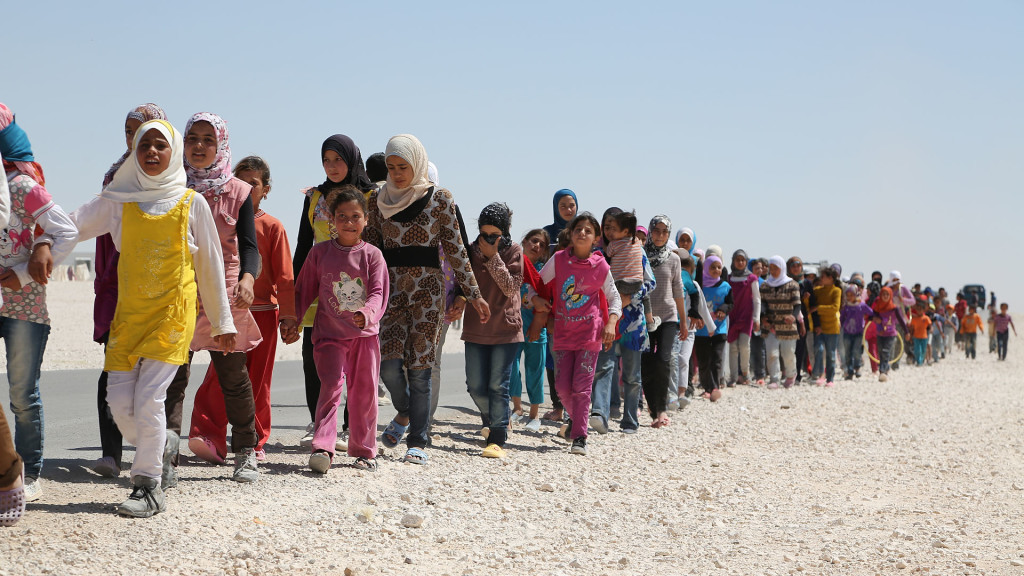
Gov. Robert Bentley on Monday ordered state agencies to use “all lawful means” to prevent the relocation of Syrian refugees to Alabama as he and other governors try to block the refugees because of fears that terrorists will slip in among them. The governor signed the executive order a day after saying he would oppose any effort to locate Syrian refugees in Alabama. “As Governor, the threat associated with allowing Syrian refugees to enter Alabama is too high, and I will not endanger the lives of Alabamians by allowing Syrian refugees to come into our beloved state,” Bentley said in a statement. Bentley is one of several governors trying to hang out the “Not Welcome Here” sign, citing concerns about terrorism after the Paris attacks and reports that one of the terrorists may have crossed into France with refugees. Immigration experts said a state governor does not have the legal authority to block refugees since the placement is done by the federal government. Bentley Communications Director Jennifer Ardis said there are health screenings and other services that state agencies provide to refugees in their resettlement process, and these would be prohibited by Bentley’s order. The order specifically instructs the Alabama Department of Public Health and the Department of Human Resources not to participate in resettlement. The order also directs the Alabama Law Enforcement Agency “to monitor and avert threats” if officials learn a Syrian refugee is living in Alabama. So far, no Syrian refugees have been relocated to Alabama; some have been accepted in nearby states. J.D McCrary, director of the Georgia chapter of the International Rescue Committee, said states can offer an opinion, but ultimately have no say in where refugees are located. “State governments and governors can provide feedback, but ultimately the U.S. Department of State has the final decision,” McCrary said. The Georgia group has helped resettle 59 Syrian refugees over the past two years. McCrary said the refugees are the victims, not the perpetrators, of violence. “The refugees who are coming here are the ones that are fleeing this exact type of violence,” he said. McCrary said the refugees go through an extensive vetting process that can take years. President Barack Obama‘s administration has pledged to accept about 10,000 Syrian refugees, saying the U.S should do more to help those fleeing terrorism. Alabama takes in a low number of refugees overall compared to other parts of the country. The state took in 107 refugees in fiscal year 2014, one of the lowest numbers of any state, according to the U.S. Office of Refugee Resettlement. Only five states took in a fewer number of refugees that year. Refugees tend to be relocated to places where they have existing family, or community members, to help them, McCrary said. Monsignor Michael Farmer of the Archdiocese of Mobile said the church’s refugee charity has not been asked by the federal government to help with Syrian refugees. Republished with permission of The Associated Press.
Robert Bentley: No more Syrian refugees after Paris attacks
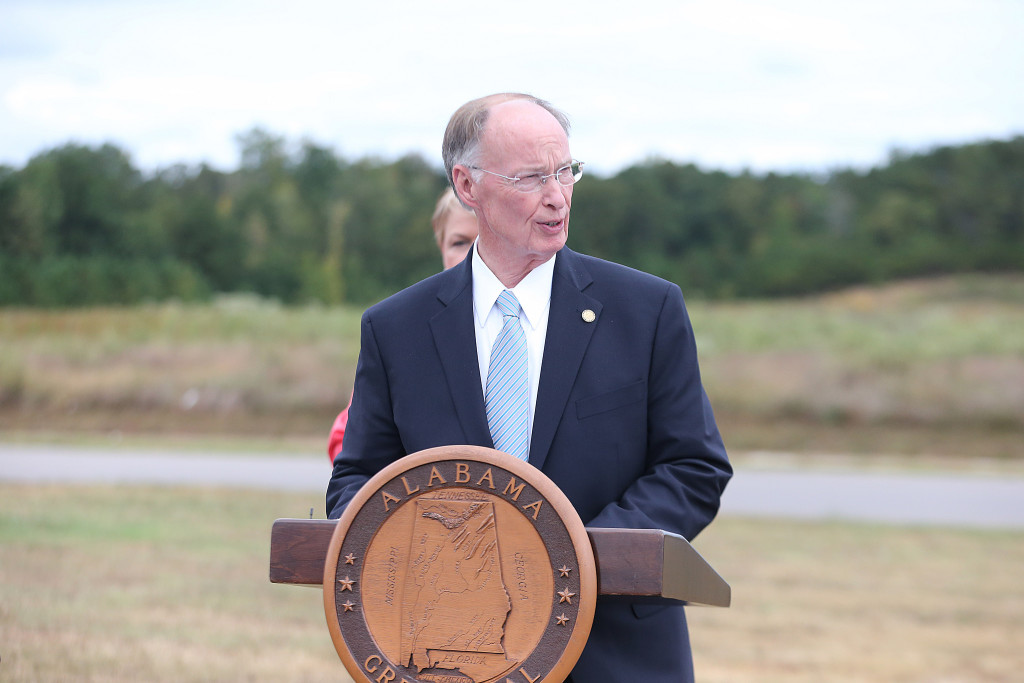
The state of Alabama will not take on more refugees fleeing Syrian said Gov. Robert Bentley in a tweet followed up by an official statement Sunday night, even “after full consideration” of last week’s attacks in Paris by an Islamic jihadist group, “I will oppose any attempt to relocate Syrian refugees to Alabama through the U.S. Refugee Admissions Program,” said Bentley. “As your Governor, I will not stand complicit to a policy that places the citizens of Alabama in harm’s way.” Bentley said he made his decision out of an abundance of compassion, rather than a lack of it. “The acts of terror committed over the weekend are a tragic reminder to the world that evil exists and takes the form of terrorists who seek to destroy the basic freedoms we will always fight to preserve,” said Bentley. “I will not place Alabamians at even the slightest, possible risk of an attack on our people. Please continue to join me in praying for those who have suffered loss and for those who will never allow freedom to fade at the hands of terrorists,” Bentley added. The announcement sets up another battle with the administration of President Barack Obama, who is urging governors to comply with federal efforts to relocated displaced citizens from the war-torn nation which borders Iraq, Lebanon, and Turkey, which has taken in millions of Syrians. The state has one U.S. State Department-approved refugee processing center, in Mobile. Neighboring states have processed a small number of refugees, but Bentley’s announcement this weekend means Alabama will not. Bentley also said the Alabama Law Enforcement Agency is working “diligently” alongside federal authorities to monitor possible terror threats, with recent events leading to an increased presences at large public gatherings.
Marco Rubio: Israel, Europe, U.S. in same fight against terrorism

Republican presidential candidate Marco Rubio says Israel’s fight against terrorism is the same one being fought by the United States and Europe. The Florida senator spoke in Miami Beach during a large rally in support of Israel and against anti-Semitism. He says the threat to Jerusalem and Tel Aviv is the same as the threat to Paris, London and U.S. cities. And Rubio warns against “casting out one of our own”— meaning Israel — in hopes of appeasing jihadis. He was joined at the rally by Democratic Sen. Bill Nelson and other top Florida lawmakers. The “Never Again” rally was organized by major Jewish organizations to bring attention to attacks on Israel and to commemorate the 77th anniversary of Kristallnacht, the Night of Broken Glass. Republished with permission of the Associated Press.


